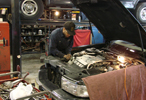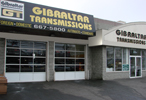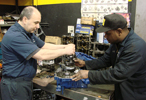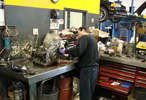
|
|
|
| HOURS OF OPERATION | ||
| MONDAY | 8:00 AM - 5:30 PM | |
| TUESDAY | 8:00 AM - 5:30 PM | |
| WEDNESDAY | 8:00 AM - 5:30 PM | |
| THURSDAY | 8:00 AM - 5:30 PM | |
| FRIDAY | 8:00 AM - 5:30 PM | |
| SATURDAY | 8:00 AM - 1:00 PM | |
| SUNDAY | CLOSED | |
| TRANSMISSION INFO |
Together with a good driver and a good engine, an
automatic transmission in top condition is one of the
most important elements in any car. The connecting
link between the engine
 and the wheels, the transmission
puts the engine's power at the driver's disposal.
GIBRALTAR TRANSMISSIONS has developed this to give you a
clearer understanding of your transmission. and the wheels, the transmission
puts the engine's power at the driver's disposal.
GIBRALTAR TRANSMISSIONS has developed this to give you a
clearer understanding of your transmission. The information on this site will educate you regarding its operation and preventive maintenance, as well as the tell-tale symptoms of transmission failure. More importantly, it will enable you to distinguish problems that are beyond the scope of all but the most experienced mechanics, In those cases, the specialists at your Hylan Boulevard GIBRALTAR TRANSMISSIONS are the best friends your car could have. YOUR AUTOMATIC TRANSMISSION AT-A-GLANCE 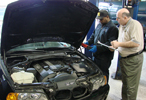 The Transmission is the component which delivers
power from the engine to the drive wheels, and regulates
turning force (torque).
An automatic transmission generally uses three forward
gears to combine speed and torque: The Transmission is the component which delivers
power from the engine to the drive wheels, and regulates
turning force (torque).
An automatic transmission generally uses three forward
gears to combine speed and torque:FIRST (or starting) gear delivers maximum torque and minimum speed. SECOND (accelerating and hill-climbing) gear gives medium torque and medium speed. THIRD gear allows maximum speed and minimum torque when the car is under way. REVERSE gear offers backward movement. There are four primary parts of an automatic
transmission: In essence, the torque converter pairs the engine to the transmission, multiplies the engine torque, and prevents the car from "stalling out" when coming to a stop. How do I get in
Gear? Reacting to instructions from the engine, the transmission automatically engages or disengages the gears in various combinations to provide low, medium, or high speeds. The transmission sends power along the drive shaft to the differential gears in the axle, from which torque is transmitted to the drive wheels - the ones which propel the car. THE DO'S & DONT'S OF AVOIDING THE "TRANSMISSION FAILURE BLUES" Do...check malfunctions immediately. Know what the warning signals are and have them analyzed at once. The longer you put off repairs, the greater the damage may be. Do...install a cooler in your transmission, particularly for towing or carrying heavy loads, or if you do most of your driving in hot weather. Coolers are relatively inexpensive protection. Let your GIBRALTAR TRANSMISSIONS professional demonstrate what one can do for your transmission. Do...have your car tuned up on a regular basis, to head off the wear and gear problems that are associated with fast idling. Don't...play 'transmission technician.' It's too intricate and too valuable for even a gifted amateur mechanic. Trying to deal with your transmission yourself could give you big headaches - and an even bigger bill. Don't...stop and start suddenly. This can cause broken engine mounts which in turn could damage the transmission. Don't...spin the wheels in sand, snow, or on hills. Dig yourself our - or get a tow. Spinning can lead to major transmission damage. Don't...leave your car in Park (P) without engaging your parking brake. Another vehicle could nudge your car, causing the parking break pawl to snap. Don't...shift to a lower gear at traffic lights, as a substitute for breaking. This is a poor practice that wears down the transmission. Don't...tow another car with your vehicle if it can possibly be avoided. If you must, follow this rule for the other vehicle: If it has front-wheel drive, make sure the front wheels are off the ground; vice-versa for cars with rear-wheel drive. THE "UNLUCKY 13" WARNING SIGNS YOU SHOUDL LOOK FOR: You should also be
alert to the sound that may indicate a problem with the
transmission: If you notice any of these
symptoms take your car to Hylan Boulevard Fortunately, not every symptom of the kind listed
indicates a major transmission failure. The
following are more likely to be signs of linkage
trouble, which generally means a simple and quick
repair: Below are symptoms that suggest transmission problems
but probably are not: CHECK IT OR LOSE IT Your GIBRALTAR TRANSMISSIONS professional will also want to check your linkage and bands (if applicable) twice a year and, if necessary, adjust them. When you bring your vehicle to GIBRALTAR TRANSMISSIONS,
the specially trained technician will perform a free
TRANS-CHECK, which consists of: Computerized Diagnosis Should your transmission require an internal inspection, you would have to leave the vehicle for only a short period of time. During this time, the GIBRALTAR TRANSMISSIONS specialist will remove, dismantle, and inspect your transmission to determine the nature of the problem. What are my options? GIBRALTAR offers several options for your to choose from. See your GIBRALTAR TRANSMISSIONS specialist, for full details regarding the warranties available. The Long and Short of
it GIBRALTAR TRANSMISSIONS provides quality workmanship at a reasonable cost to the customer. Your vehicle will be back on the road just as fast as GIBRALTAR TRANSMISSIONS' high standards permit. Give us a call and learn why for professional, efficient and convenient transmission repairs, GIBRALTAR TRANSMISSIONS is the place to go. |
Copyright © 2008 Gibraltar Transmissions. All Rights Reserved.
